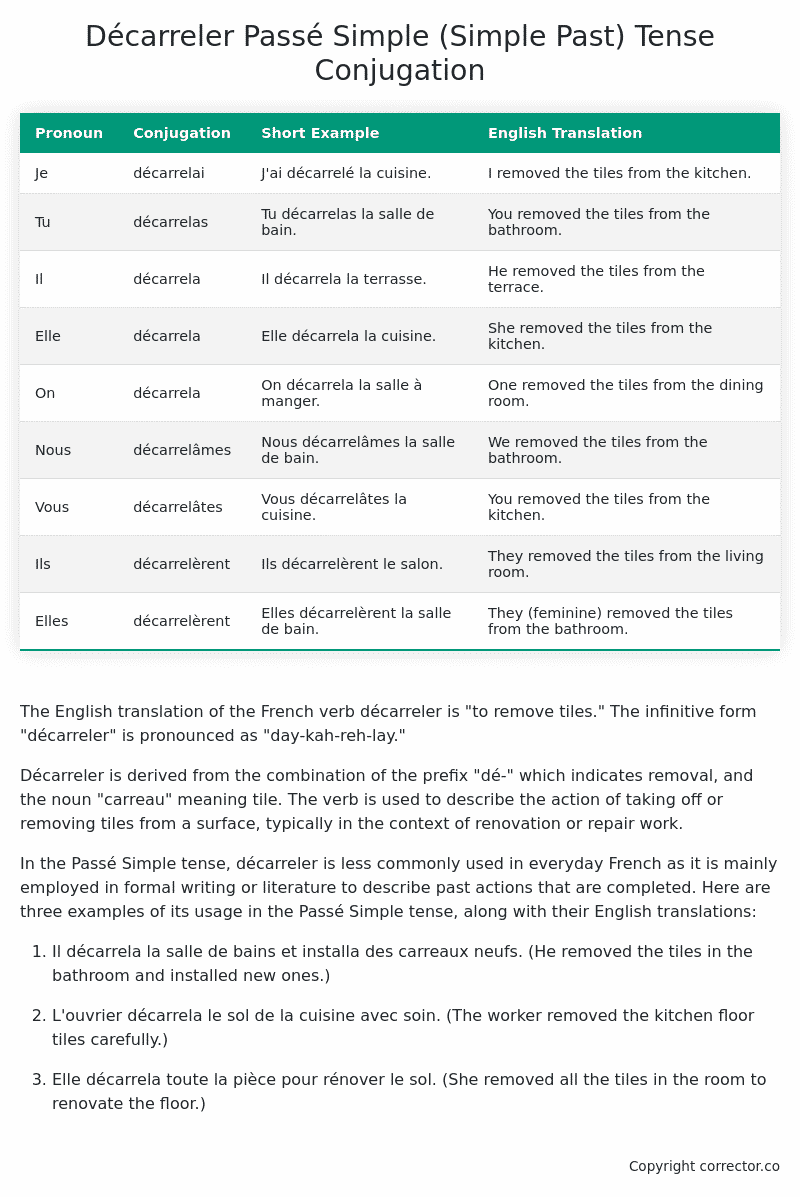Passé Simple (Simple Past) Tense Conjugation of the French Verb décarreler
Introduction to the verb décarreler
The English translation of the French verb décarreler is “to remove tiles.” The infinitive form “décarreler” is pronounced as “day-kah-reh-lay.”
Décarreler is derived from the combination of the prefix “dé-” which indicates removal, and the noun “carreau” meaning tile. The verb is used to describe the action of taking off or removing tiles from a surface, typically in the context of renovation or repair work.
In the Passé Simple tense, décarreler is less commonly used in everyday French as it is mainly employed in formal writing or literature to describe past actions that are completed. Here are three examples of its usage in the Passé Simple tense, along with their English translations:
-
Il décarrela la salle de bains et installa des carreaux neufs.
(He removed the tiles in the bathroom and installed new ones.) -
L’ouvrier décarrela le sol de la cuisine avec soin.
(The worker removed the kitchen floor tiles carefully.) -
Elle décarrela toute la pièce pour rénover le sol.
(She removed all the tiles in the room to renovate the floor.)
Table of the Passé Simple (Simple Past) Tense Conjugation of décarreler
| Pronoun | Conjugation | Short Example | English Translation |
|---|---|---|---|
| Je | décarrelai | J’ai décarrelé la cuisine. | I removed the tiles from the kitchen. |
| Tu | décarrelas | Tu décarrelas la salle de bain. | You removed the tiles from the bathroom. |
| Il | décarrela | Il décarrela la terrasse. | He removed the tiles from the terrace. |
| Elle | décarrela | Elle décarrela la cuisine. | She removed the tiles from the kitchen. |
| On | décarrela | On décarrela la salle à manger. | One removed the tiles from the dining room. |
| Nous | décarrelâmes | Nous décarrelâmes la salle de bain. | We removed the tiles from the bathroom. |
| Vous | décarrelâtes | Vous décarrelâtes la cuisine. | You removed the tiles from the kitchen. |
| Ils | décarrelèrent | Ils décarrelèrent le salon. | They removed the tiles from the living room. |
| Elles | décarrelèrent | Elles décarrelèrent la salle de bain. | They (feminine) removed the tiles from the bathroom. |
Other Conjugations for Décarreler.
Le Present (Present Tense) Conjugation of the French Verb décarreler
Imparfait (Imperfect) Tense Conjugation of the French Verb décarreler
Passé Simple (Simple Past) Tense Conjugation of the French Verb décarreler (You’re reading it right now!)
Passé Composé (Present Perfect) Tense Conjugation of the French Verb décarreler
Futur Simple (Simple Future) Tense Conjugation of the French Verb décarreler
Futur Proche (Near Future) Tense Conjugation of the French Verb décarreler
Plus-que-parfait (Pluperfect) Tense Conjugation of the French Verb décarreler
Passé Antérieur (Past Anterior) Tense Conjugation of the French Verb décarreler
Futur Antérieur (Future Anterior) Tense Conjugation of the French Verb décarreler
Subjonctif Présent (Subjunctive Present) Tense Conjugation of the French Verb décarreler
Subjonctif Passé (Subjunctive Past) Tense Conjugation of the French Verb décarreler
Subjonctif Imparfait (Subjunctive Imperfect) Tense Conjugation of the French Verb décarreler
Subjonctif Plus-que-parfait (Subjunctive Pluperfect) Tense Conjugation of the French Verb décarreler
Conditionnel Présent (Conditional Present) Tense Conjugation of the French Verb décarreler
Conditionnel Passé (Conditional Past) Tense Conjugation of the French Verb décarreler
Conditionnel Passé II (Conditional Past II) Tense Conjugation of the French Verb décarreler
L’impératif Présent (Imperative Present) Tense Conjugation of the French Verb décarreler
L’impératif Passé (Imperative Past) Tense Conjugation of the French Verb décarreler
L’infinitif Présent (Infinitive Present) Tense Conjugation of the French Verb décarreler
L’infinitif Passé (Infinitive Past) Tense Conjugation of the French Verb décarreler
Le Participe Présent (Present Participle) Tense Conjugation of the French Verb décarreler
Le Participe Passé (Past Participle) Tense Conjugation of the French Verb décarreler
Struggling with French verbs or the language in general? Why not use our free French Grammar Checker – no registration required!
Get a FREE Download Study Sheet of this Conjugation 🔥
Simply right click the image below, click “save image” and get your free reference for the décarreler Passé Simple tense conjugation!

Décarreler – About the French Passé Simple (Simple Past) Tense
Formation
Usage
Narration
Historical Context
Interactions with other tenses
Passé Composé
Imparfait
Conditional and Subjunctive
Summary
I hope you enjoyed this article on the verb décarreler. Still in a learning mood? Check out another TOTALLY random French verb conjugation!


